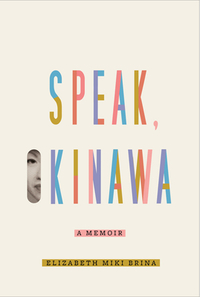Take a photo of a barcode or cover
emotional
informative
reflective
slow-paced
"I believe we inherit sin as much as we inherit trauma. I believe inherited sin is its own form of trauma. But maybe we have a chance at redemption. By being aware, being honest. By giving up power. By letting the world change. By changing ourselves. By apologizing. By forgiving? What would atonement and forgiveness look like? Within a person, a family, a nation?"
-
Speak, Okinawa by Elizabeth Miki Brina is such a creative memoir. It is the story of Elizabeth growing up in America as the daughter of an Okinawan mother and an American father, who met while her father was stationed in Okinawa as a soldier. I loved the way that Brina combined her personal experiences of growing up seperated from an island and a culture she knew little about, with the history of Okinawa. I knew practically nothing about Okinawa even though America has taken over much of the land for military purposes. This book educated me. I didn't know that Okinawa was colonized and ruled by Japan and lost most of its culture, language, and land. Elizabeth learns these things herself for the first time after spending a life resenting a mother who never seemed to fit in in America. She discusses the ways her internal racism affected the negative way she viewed herself. She talks about redemption and being sorry for the way she treated her mother in her youth. I'd recommend this to anyone who enjoys memoirs, history, and learning about other cultures. Especially if you read to understand the impacts of colonialism in our world. Also, @thereadingwomen has a podcast episode where they interview the author and it's really good!
-
Speak, Okinawa by Elizabeth Miki Brina is such a creative memoir. It is the story of Elizabeth growing up in America as the daughter of an Okinawan mother and an American father, who met while her father was stationed in Okinawa as a soldier. I loved the way that Brina combined her personal experiences of growing up seperated from an island and a culture she knew little about, with the history of Okinawa. I knew practically nothing about Okinawa even though America has taken over much of the land for military purposes. This book educated me. I didn't know that Okinawa was colonized and ruled by Japan and lost most of its culture, language, and land. Elizabeth learns these things herself for the first time after spending a life resenting a mother who never seemed to fit in in America. She discusses the ways her internal racism affected the negative way she viewed herself. She talks about redemption and being sorry for the way she treated her mother in her youth. I'd recommend this to anyone who enjoys memoirs, history, and learning about other cultures. Especially if you read to understand the impacts of colonialism in our world. Also, @thereadingwomen has a podcast episode where they interview the author and it's really good!
This was a great memoir. So well written and engaging, I enjoyed Elizabeth's voice, and the stories she told were invisibly vivid. I enjoyed the switch in perspectives and how much I learned about Okinawa. Her story was sad, and heart breaking at times.
I cried every single moment reading this story lol. I feel like my family is seen. I’m so happy this book is getting traction and people are learning. Free Okinawa.
emotional
reflective
sad
medium-paced
Speak, Okinawa, is a memoir written by Elizabeth Miki Brina about her life having parents who met in Okinawa and married. Her father wanted to rescue her mother, who wanted to escape a lifetime of being poor. Throughout the book she discusses what names mean, how her name Elizabeth came from her father's family history, and Miki is from her Okinawan mother. She talks about what each word means and why it was chosen. I loved this throughout the book.
Her story kind of reminded me a bit of Group. This doesn’t discuss therapy, but that writing was a process of discovery for her. She discusses similar types of relationships and trying to understand herself and her family.
Growing up, she was judged as a person of color, and her family's experience of inherited trauma. She also discusses the physical devastation of Okinawa by Japan and the United States military, and their struggles even through today.
"I believe we inherit sin as much as we inherit trauma. I believe inherited sin is its own form of trauma. But maybe we have a chance at redemption. By being aware, being honest. By giving up power. By letting the world change. By changing ourselves.
By apologizing.
By forgiving?
What would atonement and forgiveness look like?
Within a person, a family, a nation?" p192
And later, she writes, "Maybe love is choosing to stay. Maybe love is choosing to stay every day until the choice becomes permanent." p250
A big portion of the book is the author exploring the relationship with her mother. Early on, she mentions, "Eventually I realized that it is my responsibility to understand her, not her responsibility to make herself understood." page 31
Her mother doesn't speak or read English fluently, and in the book, she discusses the idea of writing the book and presenting the idea to her mother. She tells her mother it's about Okinawa, but also about herself, her mother and their family. Her mother replies, "You're writing about my hard life, huh?... Do you think that's interesting? Do you think people will be interesting?" "Yes, Mom. I do." "That's okay, Elizabeth. I want people to know about my hard life." P 287
She describes the loss of Okinawa of their culture. "Our kings and queens were exiled to Tokyo. Our kingdoms were dismantled...Our anju banished. Our noro banished. Our history banished. Our language banished. We were mocked for our accents when we spoke Japanese." p age 38 And more recently, "From 1952 to 1975, sixty-six thousand Japanese women immigrate to the United States as wives of U.S. servicemen. More than half of the total Japanese immigrant population." She comments that they don't know how many of these are from Okinawa, because they aren't acknowledged as Japanese citizens or U.S. citizens, but 70% of U.S. military bases in Japan are located in Okinawa.
For middle grade, there are a couple of books that speak to similar topics. Grenade by Alan Gratz (always a hugely popular writer in my library) explores this devastation in Okinawa. In this memoir, she mentions wishes and ten thousand cranes, which is explored in Sadako and the Thousand Paper Cranes.
Listen to Zibby Owens podcast with the author: https://podcasts.apple.com/us/podcast/moms-dont-have-time-to-read-books/id1366633318?i=1000510371198
Her story kind of reminded me a bit of Group. This doesn’t discuss therapy, but that writing was a process of discovery for her. She discusses similar types of relationships and trying to understand herself and her family.
Growing up, she was judged as a person of color, and her family's experience of inherited trauma. She also discusses the physical devastation of Okinawa by Japan and the United States military, and their struggles even through today.
"I believe we inherit sin as much as we inherit trauma. I believe inherited sin is its own form of trauma. But maybe we have a chance at redemption. By being aware, being honest. By giving up power. By letting the world change. By changing ourselves.
By apologizing.
By forgiving?
What would atonement and forgiveness look like?
Within a person, a family, a nation?" p192
And later, she writes, "Maybe love is choosing to stay. Maybe love is choosing to stay every day until the choice becomes permanent." p250
A big portion of the book is the author exploring the relationship with her mother. Early on, she mentions, "Eventually I realized that it is my responsibility to understand her, not her responsibility to make herself understood." page 31
Her mother doesn't speak or read English fluently, and in the book, she discusses the idea of writing the book and presenting the idea to her mother. She tells her mother it's about Okinawa, but also about herself, her mother and their family. Her mother replies, "You're writing about my hard life, huh?... Do you think that's interesting? Do you think people will be interesting?" "Yes, Mom. I do." "That's okay, Elizabeth. I want people to know about my hard life." P 287
She describes the loss of Okinawa of their culture. "Our kings and queens were exiled to Tokyo. Our kingdoms were dismantled...Our anju banished. Our noro banished. Our history banished. Our language banished. We were mocked for our accents when we spoke Japanese." p age 38 And more recently, "From 1952 to 1975, sixty-six thousand Japanese women immigrate to the United States as wives of U.S. servicemen. More than half of the total Japanese immigrant population." She comments that they don't know how many of these are from Okinawa, because they aren't acknowledged as Japanese citizens or U.S. citizens, but 70% of U.S. military bases in Japan are located in Okinawa.
For middle grade, there are a couple of books that speak to similar topics. Grenade by Alan Gratz (always a hugely popular writer in my library) explores this devastation in Okinawa. In this memoir, she mentions wishes and ten thousand cranes, which is explored in Sadako and the Thousand Paper Cranes.
Listen to Zibby Owens podcast with the author: https://podcasts.apple.com/us/podcast/moms-dont-have-time-to-read-books/id1366633318?i=1000510371198
challenging
emotional
reflective
sad
medium-paced
this was such an insightful and beautiful read. I loved reading about the generational impact that the okinawan war had on okinawans today and how it affected even more generations after. I loved reading about Elizabeth's family, her internalized racism, her struggles, and her regrets - it felt extremely genuine and I felt like I could relate. I think the thing I loved the most was just learning okinawan history and their battle with multiple powers trying to colonize them and gain control, as well as the horrors american + japanese soldiers inflicted on the citizens - it was extremely difficult to read about but I really think I gained invaluable knowledge on a forgotten part of history no one talks about.
challenging
emotional
hopeful
informative
inspiring
reflective
sad
fast-paced
emotional
inspiring
reflective
sad
slow-paced
Graphic: Alcoholism, Alcohol
Moderate: Racism
challenging
emotional
reflective
sad
tense
medium-paced
challenging
dark
emotional
hopeful
inspiring
reflective
sad
tense
medium-paced
She just wants to be close. She just wants to be home. She doesn't understand, and I don't either - I won't, not for a long time - why I feel so different from her, why I want so desperately to be so different from people like her.
This book was outside of my usual realm of fiction fantasy, etc., but it was really good. It's beautifully written and poignant, and it evoked so many emotions while reading. Like seriously, there were tears in my eyes as I finished the last chapter. Elizabeth Miki Brina masterfully weaved together the history and hardships of Okinawa with her own experience and family dynamic.
I believe we inherit sin as much as we inherit trauma. I believe inherited sin is its own form of trauma. But maybe we have a chance at redemption. By being aware, being honest. By giving up power. By changing ourselves. By apologizing. By forgiving? What would atonement look and forgiveness look like? Within a person, a family, a nation?
I really enjoyed the amount of reflection on past experiences in childhood and adulthood that were included, as well as the journey of understanding, forgiving, and repairing in the relationships in the book. I also thought that Elizabeth Miki Brina did a great job not only bringing awareness to Okinawa's past, but also its present and how the Japanese and US governments continue to fail this land and its people. Overall a 4.5 star read for me.
This book was outside of my usual realm of fiction fantasy, etc., but it was really good. It's beautifully written and poignant, and it evoked so many emotions while reading. Like seriously, there were tears in my eyes as I finished the last chapter. Elizabeth Miki Brina masterfully weaved together the history and hardships of Okinawa with her own experience and family dynamic.
I believe we inherit sin as much as we inherit trauma. I believe inherited sin is its own form of trauma. But maybe we have a chance at redemption. By being aware, being honest. By giving up power. By changing ourselves. By apologizing. By forgiving? What would atonement look and forgiveness look like? Within a person, a family, a nation?
I really enjoyed the amount of reflection on past experiences in childhood and adulthood that were included, as well as the journey of understanding, forgiving, and repairing in the relationships in the book. I also thought that Elizabeth Miki Brina did a great job not only bringing awareness to Okinawa's past, but also its present and how the Japanese and US governments continue to fail this land and its people. Overall a 4.5 star read for me.





